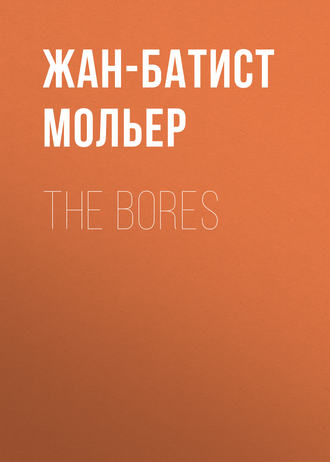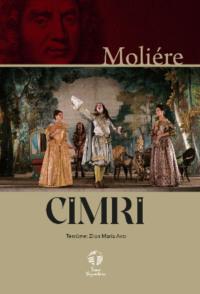 полная версия
полная версияThe Bores
OR. And now you must, by your sentence, declare whose love appears to you preferable.
(Orphise appears at the back of the stage, and sees Éraste between Orante and Climène).
ER. Since I cannot avoid giving judgment, I mean to satisfy you both at once; and, in order, not to blame that which is pleasing in your eyes, the jealous man loves more, but the other loves wisely.
CL. The judgment is very judicious; but…
ER. It is enough. I have finished. After what I have said permit me to leave you.
SCENE V. – ORPHISE, ÉRASTE
ER. (Seeing Orphise, and going to meet her). How long you have been, Madam, and how I suffer …
ORPH. Nay, nay, do not leave such a pleasant conversation. You are wrong to blame me for having arrived too late. (Pointing to Orante and Climène, who have just left). You had wherewithal to get on without me.
ER. Will you be angry with me without reason, and reproach me with what I am made to suffer? Oh, I beseech you, stay …
ORPH. Leave me, I beg, and hasten to rejoin your company.
SCENE VI. – ÉRASTE, alone
Heaven! must bores of both sexes conspire this day to frustrate my dearest wishes? But let me follow her in spite of her resistance, and make my innocence clear in her eyes.
SCENE VII. – DORANTE, ÉRASTE
DOR. Ah, Marquis, continually we find tedious people interrupting the course of our pleasures! You see me enraged on account of a splendid hunt, which a booby … It is a story I must relate to you.
ER. I am looking for some one, and cannot stay.
DOR. (Retaining him). Egad, I shall tell it you as we go along. We were a well selected company who met yesterday to hunt a stag; on purpose we went to sleep on the ground itself – that is, my dear sir, far away in the forest. As the chase is my greatest pleasure, I wished, to do the thing well, to go to the wood myself; we decided to concentrate our efforts upon a stag which every one said was seven years old.
[Footnote: The original expression is cerf dix-corps; this, according to the dictionnaire de chasse, is a seven years' old animal.]
But my own opinion was – though I did not stop to observe the marks – that it was only a stag of the second year.
[Footnote: The technical term is: "a knobbler;" in French, _un cerf à sa seconde tête.]
We had separated, as was necessary, into different parties, and were hastily breakfasting on some new-laid eggs, when a regular country-gentleman, with a long sword, proudly mounted on his brood-mare, which he honoured with the name of his good mare, came up to pay us an awkward compliment, presenting to us at the same time, to increase our vexation, a great booby of a son, as stupid as his father. He styled himself a great sportsman, and begged that he might have the pleasure of accompanying us. Heaven preserve every sensible sportsman, when hunting, from a fellow who carries a dog's horn, which sounds when it ought not; from those gentry who, followed by ten mangy dogs, call them "my pack," and play the part of wonderful hunters. His request granted, and his knowledge commended, we all of us started the deer,
[Footnote: The original has frapper à nos brisées; brisées means "blinks." According to Dr. Ash's Dictionary, 1775, "Blinks are the boughs or branches thrown in the way of a deer to stop its course."]
within thrice the length of the leash, tally-ho! the dogs were put on the track of the stag. I encouraged them, and blew a loud blast. My stag emerged from the wood, and crossed a pretty wide plain, the dogs after him, but in such good order that you could have covered them all with one cloak. He made for the forest. Then we slipped the old pick upon him; I quickly brought out my sorrel-horse. You have seen him?
ER. I think not.
DOR. Not seen him? The animal is as good as he is beautiful; I bought him some days ago from Gaveau.
[Footnote: A well-known horse-dealer in Molière's time.]
I leave you to think whether that dealer, who has such a respect for me, would deceive me in such a matter; I am satisfied with the horse. He never indeed sold a better, or a better-shaped one. The head of a barb, with a clear star; the neck of a swan, slender, and very straight; no more shoulder than a hare; short-jointed, and full of vivacity in his motion. Such feet – by Heaven! such feet! – double-haunched: to tell you the truth, it was I alone who found the way to break him in. Gaveau's Little John never mounted him without trembling, though he did his best to look unconcerned. A back that beats any horse's for breadth; and legs! O ye Heavens!
[Footnote: Compare the description of the horse given by the Dauphin in Shakespeare's Henry V., Act iii., Scene 6, and also that of the "round hoof'd, short jointed" jennet in the Venus and Adonis of the same author.]
In short, he is a marvel; believe me, I have refused a hundred pistoles for him, with one of the horses destined for the King to boot. I then mounted, and was in high spirits to see some of the hounds coursing over the plain to get the better of the deer. I pressed on, and found myself in a by-thicket at the heels of the dogs, with none else but Drecar.
[Footnote: A famous huntsman in Molière's time.]
There for an hour our stag was at bay. Upon this, I cheered on the dogs, and made a terrible row. In short, no hunter was ever more delighted! I alone started him again; and all was going on swimmingly, when a young stag joined ours. Some of my dogs left the others. Marquis, I saw them, as you may suppose, follow with hesitation, and Finaut was at a loss. But he suddenly turned, which delighted me very much, and drew the dogs the right way, whilst I sounded horn and hallooed, "Finaut! Finaut!" I again with pleasure discovered the track of the deer by a mole-hill, and blew away at my leisure. A few dogs ran back to me, when, as ill-luck would have it, the young stag came over to our country bumpkin. My blunderer began blowing like mad, and bellowed aloud, "Tallyho! tallyho! tallyho!" All my dogs left me, and made for my booby. I hastened there, and found the track again on the highroad. But, my dear fellow, I had scarcely cast my eyes on the ground, when I discovered it was the other animal, and was very much annoyed at it. It was in vain to point out to the country fellow the difference between the print of my stag's hoof and his. He still maintained, like an ignorant sportsman, that this was the pack's stag; and by this disagreement he gave the dogs time to get a great way off. I was in a rage, and, heartily cursing the fellow, I spurred my horse up hill and down dale, and brushed through boughs as thick as my arm. I brought back my dogs to my first scent, who set off, to my great joy, in search of our stag, as though he were in full view. They started him again; but, did ever such an accident happen? To tell you the truth, Marquis, it floored me. Our stag, newly started, passed our bumpkin, who, thinking to show what an admirable sportsman he was, shot him just in the forehead with a horse-pistol that he had brought with him, and cried out to me from a distance, "Ah! I've brought the beast down!" Good Heavens! did any one ever hear of pistols in stag-hunting? As for me, when I came to the spot, I found the whole affair so odd, that I put spurs to my horse in a rage, and returned home at a gallop, without saying a single word to that ignorant fool.
ER. You could not have done better; your prudence was admirable. That is how we must get rid of bores. Farewell.
DOR. When you like, we will go somewhere where we need not dread country-hunters.
ER. (Alone). Very well. I think I shall lose patience in the end.
Let me make all haste, and try to excuse myself.
BALLET TO ACT II
First Entry.
Bowlers stop Éraste to measure a distance about which there is a dispute. He gets clear of them with difficulty, and leaves them to dance a measure, composed of all the postures usual to that game.
Second Entry.
Little boys with slings enter and interrupt them, who are in their turn driven out by
Third Entry.
Cobblers, men and women, their fathers, and others, who are also driven out in their turn.
Fourth Entry.
A gardener, who dances alone, and then retires.
* * * * *ACT III
SCENE I. – ÉRASTE, LA MONTAGNE
ER. It is true that on the one hand my efforts have succeeded; the object of my love is at length appeased. But on the other hand I am wearied, and the cruel stars have persecuted my passion with double fury. Yes, Damis, her guardian, the worst of bores, is again hostile to my tenderest desires, has forbidden me to see his lovely niece, and wishes to provide her to-morrow with another husband. Yet Orphise, in spite of his refusal, deigns to grant me this evening a favour; I have prevailed upon the fair one to suffer me to see her in her own house, in private. Love prefers above all secret favours; it finds a pleasure in the obstacle which it masters; the slightest conversation with the beloved beauty becomes, when it is forbidden, a supreme favour. I am going to the rendezvous; it is almost the hour; since I wish to be there rather before than after my time.
LA M. Shall I follow you?
ER. No. I fear least you should make me known to certain suspicious persons.
LA M. But …
ER. I do not desire it.
LA M. I must obey you. But at least, if at a distance…
ER. For the twentieth time will you hold your tongue? And will you never give up this practice of perpetually making yourself a troublesome servant?
SCENE II. – CARITIDÈS; ÉRASTE
CAR. Sir, it is an unseasonable time to do myself the honour of waiting upon you; morning would be more fit for performing such a duty, but it is not very easy to meet you, for you are always asleep, or in town. At least your servants so assure me. I have chosen this opportunity to see you. And yet this is a great happiness with which fortune favours me, for a couple of moments later I should have missed you.
ER. Sir, do you desire something of me?
CAR. I acquit myself, sir, of what I owe you; and come to you … Excuse the boldness which inspires me, if…
ER. Without so much ceremony, what have you to say to me?
CAR. As the rank, wit, and generosity which every one extols in you…
ER. Yes, I am very much extolled. Never mind that, sir.
CAR. Sir, it is a vast difficulty when a man has to introduce himself; we should always be presented to the great by people who commend us in words, whose voice, being listened to, delivers with authority what may cause our slender merit to be known. In short, I could have wished that some persons well-informed could have told you, sir, what I am…
ER. I see sufficiently, sir, what you are. Your manner of accosting me makes that clear.
CAR. Yes, I am a man of learning charmed by your worth; not one of those learned men whose name ends simply in us. Nothing is so common as a name with a Latin termination. Those we dress in Greek have a much superior look; and in order to have one ending in ès, I call myself Mr. Caritidès.
ER. Caritidès be it. What have you to say?
CAR. I wish, sir, to read you a petition, which I venture to beg of you to present to the King, as your position enables you to do.
ER. Why, sir, you can present it yourself! …
CAR. It is true that the King grants that supreme favour; but, from the very excess of his rare kindness, so many villainous petitions, sir, are presented that they choke the good ones; the hope I entertain is that mine should be presented when his Majesty is alone.
ER. Well, you can do it, and choose your own time.
CAR. Ah, sir, the door-keepers are such terrible fellows! They treat men of learning like snobbs and butts; I can never get beyond the guard-room. The ill-treatment I am compelled to suffer would make me withdraw from court for ever, if I had not conceived the certain hope that you will be my Mecaeænas with the King. Yes, your influence is to me a certain means …
ER. Well, then, give it me; I will present it.
CAR. Here it is. But at least, hear it read.
ER. No …
CAR. That you may be acquainted with it, sir, I beg.
"TO THE KING"Sire, – Your most humble, most obedient, most faithful and most learned subject and servant, Caritidès, a Frenchman by birth, a Greek
[Footnote: The original has Grec, a Greek. Can Caritidès have wished to allude to the græaca fides? Grec means also a cheat at cards, and is said to owe its name to a certain Apoulos, a knight of Greek origin, who was caught in the very act of cheating at play in the latter days of Louis XIV.'s reign, even in the palace of the grand monarque.]
_by profession, having considered the great and notable abuses which are perpetrated in the inscriptions on the signs of houses, shops, taverns, bowling-alleys, and other places in your good city of Paris; inasmuch as certain ignorant composers of the said inscriptions subvert, by a barbarous, pernicious and hateful spelling, every kind of sense and reason, without any regard for etymology, analogy, energy or allegory whatsoever, to the great scandal of the republic of letters, and of the French nation, which is degraded and dishonoured, by the said abuses and gross faults, in the eyes of strangers, and notably of the Germans, curious readers and inspectors of the said inscriptions…"
[Footnote: This is an allusion either to the reputation of the Germans as great drinkers, or as learned decipherers of all kinds of inscriptions.]
ER. This petition is very long, and may very likely weary…
CAR. Ah, sir, not a word could be cut out.
ER. Finish quickly.
CAR. (Continuing). "Humbly petitions your Majesty to constitute, for the good of his state and the glory of his realm, an office of controller, supervisor, corrector, reviser and restorer in general of the said inscriptions; and with this office to honour your suppliant, as well in consideration of his rare and eminent erudition, as of the great and signal services which he has rendered to the state and to your Majesty, by making the anagram of your said Majesty in French, Latin, Greek, Hebrew, Syriac, Chaldean, Arabic…"
ER. (Interrupting him). Very good. Give it me quickly and retire: it shall be seen by the King; the thing is as good as done.
CAR. Alas! sir, to show my petition is everything. If the King but see it, I am sure of my point; for as his justice is great in all things, he will never be able to refuse my prayer. For the rest, to raise your fame to the skies, give me your name and surname in writing, and I will make a poem, in which the first letters of your name shall appear at both ends of the lines, and in each half measure.
ER. Yes, you shall have it to-morrow, Mr. Caritidès. (Alone). Upon my word, such learned men are perfect asses. Another time I should have heartily laughed at his folly.
SCENE III. – ORMIN, ÉRASTE
ORM. Though a matter of great consequence brings me here, I wished that man to leave before speaking to you.
ER. Very well. But make haste; for I wish to be gone.
ORM. I almost fancy that the man who has just left you has vastly annoyed you, sir, by his visit. He is a troublesome old man whose mind is not quite right, and for whom I have always some excuse ready to get rid of him. On the Mall, in the Luxembourg,
[Footnote: The Mall was a promenade in Paris, shaded by trees, near the Arsenal.]
[Footnote: The Luxembourg was in Molière's time the most fashionable promenade of Paris.]
and in the Tuileries he wearies people with his fancies; men like you should avoid the conversation of all those good-for-nothing pedants. For my part I have no fear of troubling you, since I am come, sir, to make your fortune.
ER. (Aside). This is some alchymist: one of those creatures who have nothing, and are always promising you ever so much riches. (Aloud). Have you discovered that blessed stone, sir, which alone can enrich all the kings of the earth?
ORM. Aha! what a funny idea! Heaven forbid, sir, that I should be one of those fools. I do not foster idle dreams; I bring you here sound words of advice which I would communicate, through you, to the King, and which I always carry about me, sealed up. None of those silly plans and vain chimeras which are dinned in the ears of our superintendents;
[Footnote: This is an allusion to the giver of the feast, Mons. Fouquet, surintendant des finances. See also page 299, note I.]
none of your beggarly schemes which rise to no more than twenty or thirty millions; but one which, at the lowest reckoning, will give the King a round four hundred millions yearly, with ease, without risk or suspicion, without oppressing the nation in any way. In short, it is a scheme for an inconceivable profit, which will be found feasible at the first explanation. Yes, if only through you I can be encouraged …
ER. Well, we will talk of it. I am rather in a hurry.
ORM. If you will promise to keep it secret, I will unfold to you this important scheme.
ER. No, no; I do not wish to know your secret.
ORM. Sir, I believe you are too discreet to divulge it, and I wish to communicate it to you frankly, in two words. I must see that none can hear us. (After seeing that no one is listening, he approaches Eraste's ear). This marvellous plan, of which I am the inventor, is…
ER. A little farther off, sir, for a certain reason.
ORM. You know, without any need of my telling you, the great profit which the King yearly receives from his seaports. Well, the plan of which no one has yet thought, and which is an easy matter, is to make all the coasts of France into famous ports. This would amount to vast sums; and if …
ER. The scheme is good, and will greatly please the King. Farewell. We shall see each other again.
ORM. At all events assist me, for you are the first to whom I have spoken of it.
ER. Yes, yes.
ORM. If you would lend me a couple of pistoles, you could repay yourself out of the profits of the scheme …
ER. (Gives money to Ormin). Gladly. (Alone). Would to Heaven, that at such a price I could get rid of all who trouble me! How ill-timed their visit is! At last I think I may go. Will any one else come to detain me?
SCENE IV. – FILINTE, ÉRASTE
FIL. Marquis, I have just heard strange tidings.
ER. What?
FIL. That some one has just now quarrelled with you.
ER. With me?
FIL. What is the use of dissimulation? I know on good authority that you have been called out; and, as your friend, I come, at all events, to offer you my services against all mankind.
ER. I am obliged to you; but believe me you do me…
FIL. You will not admit it; but you are going out without attendants. Stay in town, or go into the country, you shall go nowhere without my accompanying you.
ER. (Aside). Oh, I shall go mad.
FIL. Where is the use of hiding from me?
ER. I swear to you, Marquis, that you have been deceived.
FIL. It is no use denying it.
ER. May Heaven smite me, if any dispute…
FIL. Do you think I believe you?
ER. Good Heaven, I tell you without concealment that…
FIL. Do not think me such a dupe and simpleton.
ER. Will you oblige me?
FIL. No.
ER. Leave me, I pray.
FIL. Nothing of the sort, Marquis.
ER. An assignation to-night at a certain place…
FIL. I do not quit you. Wherever it be, I mean to follow you.
ER. On my soul, since you mean me to have a quarrel, I agree to it, to satisfy your zeal. I shall be with you, who put me in a rage, and of whom I cannot get rid by fair means.
FIL. That is a sorry way of receiving the service of a friend. But as I do you so ill an office, farewell. Finish what you have on hand without me.
ER. You will be my friend when you leave me. (Alone). But see what misfortunes happen to me! They will have made me miss the hour appointed.
SCENE V. – DAMIS, L'ÉPINE, ÉRASTE, LA RIVIÈRE, and his Companions
DAM. (Aside). What! the rascal hopes to obtain her in spite of me! Ah! my just wrath shall know how to prevent him!
ER. (Aside). I see some one there at Orphise's door. What! must there always be some obstacle to the passion she sanctions!
DAM. (To L'Epine). Yes, I have discovered that my niece, in spite of my care, is to receive Éraste in her room to-night, alone.
LA R. (To his companions). What do I hear those people saying of our master? Let us approach safely, without betraying ourselves.
DAM. (To L'Epine). But before he has a chance of accomplishing his design, we must pierce his treacherous heart with a thousand blows. Go and fetch those whom I mentioned just now, and place them in ambush where I told you, so that at the name of Éraste they may be ready to avenge my honour, which his passion has the presumption to outrage; to break off the assignation which brings him here, and quench his guilty flame in his blood.
LA R. (Attacking Damis with his companions). Before your fury can destroy him, wretch! you shall have to deal with us!
ER. Though he would have killed me, honour urges me here to rescue the uncle of my mistress. (To Damis). I am on your side, Sir. (He draws his sword and attacks La Rivière and his companions, whom he puts to flight.)
DAM. Heavens! By whose aid do I find myself saved from a certain death?
To whom am I indebted for so rare a service?
ER. (Returning). In serving you, I have done but an act of justice.
DAM. Heavens. Can I believe my ears! Is this the hand of Éraste?
ER. Yes, yes, Sir, it is I. Too happy that my hand has rescued you: too unhappy in having deserved your hatred.
DAM. What! Éraste, whom I was resolved to have assassinated has just used his sword to defend me! Oh, this is too much; my heart is compelled to yield; whatever your love may have meditated to-night, this remarkable display of generosity ought to stifle all animosity. I blush for my crime, and blame my prejudice. My hatred has too long done you injustice! To show you openly I no longer entertain it, I unite you this very night to your love.
SCENE VI. – ORPHISE, DAMIS, ÉRASTE
ORPH. (Entering with a silver candlestick in her hand). Sir, what has happened that such a terrible disturbance…
DAM. Niece, nothing but what is very agreeable, since, after having blamed, for a long time, your love for Éraste, I now give him to you for a husband. His arm has warded off the deadly thrust aimed at me; I desire that your hand reward him.
ORPH. I owe everything to you; if, therefore, it is to pay him your debt. I consent, as he has saved your life.
ER. My heart is so overwhelmed by this great miracle, that amidst this ecstasy, I doubt if I am awake.
DAM. Let us celebrate the happy lot that awaits you; and let our violins put us in a joyful mood. (As the violins strike up, there is a knock at the door).
ER. Who knocks so loud?
SCENE VII. – DAMIS, ORPHISE, ÉRASTE, L'ÉPINE
L'EP. Sir, here are masks, with kits and tabors.
(The masks enter, filling the stage).
ER. What! Bores for ever? Hulloa, guards, here. Turn out these rascals for me.
BALLET TO ACT III
First Entry.
Swiss guards, with halberds, drive out all the troublesome masks, and then retire to make room for a dance of
[Footnote: The origin of the introduction of the Swiss Guards (mercenaries) in the service of the French and other foreign powers may be ascribed to the fact that Switzerland itself, being too poor to maintain soldiers in time of peace, allowed them to serve other nations on condition of coming back immediately to their own cantons in time of war or invasion.
It is particularly with France that Switzerland contracted treaties to furnish certain contingents in case of need. The first of these dates back as far as 1444 between the Dauphin, afterwards Charles VII., and the different cantons. This Act was renewed in 1453, and the number of soldiers to be furnished was fixed once for all, the minimum being 6,000, and the maximum 16,000. The Helvetians, who until 1515 had always been faithful to their engagements, turned traitors in that year against Francis I., who defeated them at Marignan. But the good feeling was soon afterwards re-established, and a new treaty, almost similar to the former, restored the harmony between the two nations.









